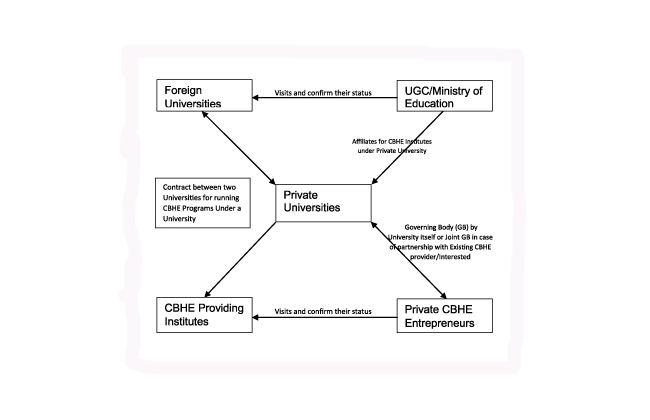
Private higher education was started in Bangladesh in 1992 under the Private University Act 1992. The law was amended in 1998 and the latest act was gazetted on July 18, 2010 as the “Private University act 2010”.
On the other hand, Cross Border Higher Education (CBHE) was started in 1989 by Private Organizations/Institutes with the Trade License. They tried to get approval from the Ministry of Education for approval but there was no law and even no desk in the Ministry to resolve this. After a series of meetings, dialogues, seminars and other initiatives, the Ministry of Education felt the necessity of CBHE and incorporated the issue in the “Private University act 2010”. As per provision of 39(2) of the Private University Act 2010, the Ministry has formulated the regulations on April 26, 2014 and published notice for application in the Daily Ittefaq and the Daily Star on September 22, 2014 in order to get affiliation of UGC. Almost 14 applications have been submitted since then so far. According to the regulations, the representatives from UGC and the Ministry visited 7 foreign campuses of the Universities asked to offer their programs. One study centre has already been given permission accordingly, which has no prior experience to run CBHE. The applications of experienced CBHE providers are still pending. As per law and regulations they applied and established all facilities and hence they have legitimate rights to get the affiliations.
In this circumstance, Association of Private Universities in Bangladesh (APUB) has reacted and shown their difference of opinion on the permission of CBHE campus/study centre, which is also very legitimate as per Private University Act 2010.
So, what should be the solutions?
Scenario – Private Universities
The birth of the private university in Bangladesh has passed about three decades. Now their existence is a evident reality with significantly successful stories in lots of the cases and with the comparison of the performance of our public universities. Now private universities are not a substitute for the public ones and they stand by their own credentials. At the initial stage, students opted for private universities in case of their failure to get enrolled in public universities but things have changed now proving the growing significance and standard of few private universities. Our private universities are saving a significant amount of money in terms of foreign exchange too.
A few Private Universities are now doing excellent in research as well, which was blamed for not doing adequate research work as is mandatory for a university. The student mobility, placement, scholarships, co-curricular and extracurricular activities are also praiseworthy. A few of the private Universities have the capability of offering PhD programs but the permission is not given to any university yet. It is almost impossible for our Private Universities to become International Standard without offering research degree/PhD programs.
On the other hand, a substantial number of private universities are facing problems to reach up to the expected standard due to poor admission. They are facing problems to meet the rents, salaries, research fund allocation, development of permanent campus etc. There are lots of barriers (new programs affiliation, setting up any Institute under the University) to expand too.
Scenario – Private CBHE Providing Institutes
Distance Learning Diploma program under University of London was started in the year 1989 in the field of Law and International Diploma in Information Technology (IT) under NCC Education, UK in the year 1990. Afterwards, Bachelor programs in the field of Law, IT and Business were introduced by several private Institutes in Bangladesh in association with several foreign Universities. A few thousands graduates are passing out yearly from these Institutes and contributing to the economy of the country. The success of the graduates from this system of distance learning is noteworthy. The maximum number of these graduates passed out from British Universities. The British Council, Bangladesh administers the final examinations of British Universities. Almost all the CBHE provider institutes applied several times, met with the relevant authorities of UGC and Ministry of Education for approval but it didn’t work at all. But unfortunately there were no desks to work for this promising CBHE sector.
However, as a result, a series of meetings, dialogues, seminars and other initiatives among the relevant stakeholders, the UGC and Ministry of Education felt the necessity of CBHE and incorporated the issue in the “Private University act 2010” and formulate CBHE regulations accordingly, where a clause 4(3)-Jha has been kept, for approving existing CBHE providers.
On the other hand, due to Corona Pandemic, online education is also reality globally including Bangladesh. This will continue and will be the new normal even after the corona pandemic so far. We guess it wouldn’t be the replacement of classroom education but the blended or hybrid mode of delivery will be continued. Cross Border Higher Education (CBHE) will automatically be matched with the same. If we, as a nation, couldn’t cope up with this new normal, we might be lagging behind in this era of globalization.
CBHE & its UNESCO definition
The UNESCO definition of cross-border higher education refers to: “…higher education that takes place in situations where the teacher, student, program, institution/provider, or course materials cross national jurisdictional borders. Cross-border higher education may include higher education by public/private and not-for-profit/for-profit providers. It encompasses a wide range of modalities, in a continuum from face-to-face (in various forms such as students travelling abroad and campuses abroad) to distance learning (using various technologies including e-learning).”
As the member state of UNESCO and a verdict in favour of CBHE from the high court, the necessity of CBHE has come into reality but Private University Act 2010 and CBHE regulations are contradictory and a serious conflict of interest, that has been raised by Association of Private Universities in Bangladesh (AUPB).
A Proposed Solution
“The Private University Act 2021” connotes for establishing the private universities, whereas CBHE providers are companies, institutes affiliated to any foreign Private or Public Universities. There are a few conflicts of laws and regulations including conflict of interest. A few Universities are striving a lot to maintain its regular operations too.
In this circumstance, allowing Private Universities as CBHE providers may solve the problem. In order to do that a little upgradation of the CBHE regulations would be required. A new window (like joint degree, validated degree, franchise programs, exchange programs etc.) will also open up for the Bangladeshi students as well. The Bangladeshi Private Universities should also allow setting up Branch Campus abroad under this CBHE regulations.
Mohammad Nuruz Zaman is the Group CEO of Daffodil Family


